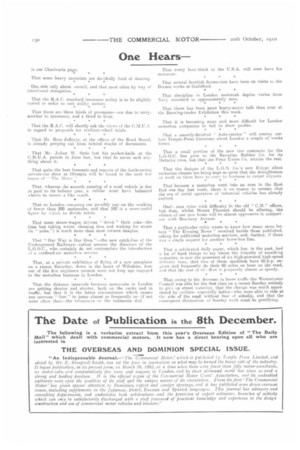One Hears—
Page 2

If you've noticed an error in this article please click here to report it so we can fix it.
is our Charivaria page.
That some heavy motorists are dev.idedly fond of dancing.
One side only about oneself, and that most often by way of intentional derogation.
That the R.A.C. standard insurance policy is to be slightly varied in ordar to suit utility motors.
That there are three kinds of greenness—one due to envy, another to ignorance, and a third to liver.
That the R.A.C. will shortly ask the views of the C.M.U.A in regard to prepceals for resilient-wheel trials.
That Mr. Rees Jeffrey's, at the offices of the Road Board, is already peeping out from behind stacks of documents.
That Mr. Julian W. Orde lost his pocket-knife at the C.M.U.A. parade in June last, but that he never said anything about it..
That quite the best forecasts and reports of the forthcoming private-car show at Olympia will be found in the next few issues of " The Mote:.
That, whereas the smooth running of a road vehicle is due in part to its balance gear, a railcar must have balanced wheels to insure a like result.
That no London company can possibly pay on the working of fewer than 200 motoreabs, and that 500 is a more-useful figure by v.hich to divide totals.
That some steam-wagon drivers " drink " their coke—the time lost taking water, cleaning fires and waiting for steam (in " pubs.") is much more than most owners imagine.
That " Our Way is Our Own "—the new catch-line of the Underground Railways—rather amuses the directors of the L.G.O.C., who certainly do not contemplate the introduction of a confined-air motorbus service.
That, at a private exhibition of flying of a new aeroplane on R. recent Saturday, down in the heart of Wiltshire. four out of the five engineer's present were not long ago engaged in the motorbus business in London. .
That the distance intervals between motereabs in London are getting shorter and shorter, bath on the ranks and in traffic, but that it is the latter circumstance which causes any nervous " fare " to jump almost as frequently as—if not more often than—the twopences on the taximeter dial.
That every boot-black in the U.S.A. will soon have his motorcar.
That several Scottish &masters have been on visits to the Dennis works at Guildford.
That discipline in London motoreab depots varies from Navy standard to approximately zero.
That there has been more heavy-motor talk than ever at the Brewing-trades Exhibition this week.
That it is becoming more and more difficult for London motorbus companies to fail to show profits.
That a smartly-linished " Auto-carrier " will convey certain Temple-Press literature about London a couple of weeks hence.
That a small portion of the new tire contracts for the L.G.O.C. has gone to the Bavarian Rubber Co. for its Metzeler tires, but that the Peter Union Co. retains the rest.
That the designs of the I.G.O. Co.'s new 13-type silent motorbus chassis are being kept so quiet that the draughtsmen at work on them have to corns to business in carpet slippers, •
That because a motorbus went into an area in the East End one day last week, there is no reason to assume that the era, o.F, aerial operation of industrial vehicles has already a IT j yed.
One., own voice with difficulty in the old " C.M." offices, hut that, whilst Mount Pleasant should be alluring, the silence of our new home will be almost oppressive in compari
sou with %lechery Avenue. • • •
That a particular critic wants to know how many more letters "The Evening News" received beside those published, asking for additional motorbus services, and, further, if there was a single request for another horse-bus line.
That a celebrated daily paper, which has, in the past, had a lot of hard things to say about the iniquity of scorching motorists, is now the possessor of six high-powered high-speed delivery vans, that two of these olachinee have 60-h.p. en,e,ines and frequently do their 60 miles an hour on the road, and that the rest of tbs fleet is purpoaely almost as speedy.
That owing to the decrease in horse traffic the Westminster Council was able for the first time on a recent Sunday entirely to give up street watering. that the change was much appro• eiated by cyclists—especially ladies—who were able to ride at the side of the road without fear of sideslip, and that the consequent diminution of Sunday work must be gratifying.




















